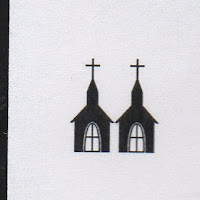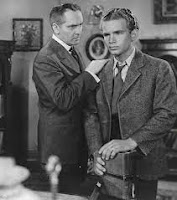Sorcerer (1977)
You could argue that a church only makes a cameo appearance in this brooding adventure film. Still, it has such a variety of illegal activities presented during that cameo that I couldn’t resist including it in Crime Month.
Sorcerer was a commercial flop. There was some puzzlement about why this well-made, tense action film didn’t find an audience. Though it's very dark, and the characters aren't particularly likable, the same could be said of director William Friedkin’s two previous films, huge hits The French Connection and The Exorcist.
Probably a big factor was the attention paid to another film that came out at the same time… Star Wars.
Sorcerer is a kind of remake of the French classic The Wages of Fear about a small group of men who must carry a truckload of nitroglycerin to put out a massive oil fire. In Friedkin’s film, however, the four men on the mission each have a backstory presented in four different prologues. In Veracruz, Mexico, we see Nilo (Francisco Rabal), an assassin, commit a political murder that sets law enforcement on his trail. In Jerusalem, a Palestinian terrorist, Kassem (Amidou), sets off a bomb and soon the Israel Defense Forces are after him. In Paris, a businessman, Victor (Bruno Cremer), is about to be convicted of fraud and flees.
These three men escape to Porvenir, a remote village in Columbia. And a fourth man, Jackie Scanlon (Roy Scheider), comes their way. His backstory features the church.
It's bingo night at The Lady of the Snow Catholic Church in Elizabeth, New Jersey. We see a back room where large amounts of cash are being counted -- not just from this church, but from other Catholic Churches as well.
There is also a wedding taking place in the church while the money is being counted. The camera takes a few moments to observe it, though it has nothing to do with the film's story. The bride appears to have a black eye and a broken nose. Knowing nothing about her story, one can’t help but wonder whether this woman is in an abusive relationship that is being blessed by, affirmed, and cemented by a priest.
But back to the counting room. Priests are counting the money, but other men in the room are wearing suits, and they certainly look like (and later prove to be) Italian Mafiosi. Three armed men break into the room and tell everyone to raise their hands and turn over the money. A shootout ensues, and one of the priests is shot.
The men rush outside, where Scanlon waits behind the steering wheel of the getaway car. As they drive away, chased by cops and the Italians, the crooks in the car get into a heated argument (“We shot a priest for $67,000. Was it worth our lives?”). The argument distracts Scanlon, who crashes into a truck. Scanlon is the only one of the four robbers to survive the crash.
Sorcerer is a kind of remake of the French classic The Wages of Fear about a small group of men who must carry a truckload of nitroglycerin to put out a massive oil fire. In Friedkin’s film, however, the four men on the mission each have a backstory presented in four different prologues. In Veracruz, Mexico, we see Nilo (Francisco Rabal), an assassin, commit a political murder that sets law enforcement on his trail. In Jerusalem, a Palestinian terrorist, Kassem (Amidou), sets off a bomb and soon the Israel Defense Forces are after him. In Paris, a businessman, Victor (Bruno Cremer), is about to be convicted of fraud and flees.
These three men escape to Porvenir, a remote village in Columbia. And a fourth man, Jackie Scanlon (Roy Scheider), comes their way. His backstory features the church.
It's bingo night at The Lady of the Snow Catholic Church in Elizabeth, New Jersey. We see a back room where large amounts of cash are being counted -- not just from this church, but from other Catholic Churches as well.
There is also a wedding taking place in the church while the money is being counted. The camera takes a few moments to observe it, though it has nothing to do with the film's story. The bride appears to have a black eye and a broken nose. Knowing nothing about her story, one can’t help but wonder whether this woman is in an abusive relationship that is being blessed by, affirmed, and cemented by a priest.
But back to the counting room. Priests are counting the money, but other men in the room are wearing suits, and they certainly look like (and later prove to be) Italian Mafiosi. Three armed men break into the room and tell everyone to raise their hands and turn over the money. A shootout ensues, and one of the priests is shot.
The men rush outside, where Scanlon waits behind the steering wheel of the getaway car. As they drive away, chased by cops and the Italians, the crooks in the car get into a heated argument (“We shot a priest for $67,000. Was it worth our lives?”). The argument distracts Scanlon, who crashes into a truck. Scanlon is the only one of the four robbers to survive the crash.
Scanlon's friends hide him when he learns that the priest who was shot was the brother of Carlo Ricci (Cosmo Allegretti), a Mafia kingpin. Scanlon's friend tells him he should leave the country because Ricci has pledged vengeance.
One of the members of his mob asks Ricci about his brother the priest. The Don replies, “He’s going to be all right. They robbed my church and shot my brother. I don’t care what it’s going to cost, track him down.”
And (spoiler) when the film ends we can see how far Ricci was willing to go to find Scanlon… Even to the secluded jungles of Columbia.
Here's what really bothers me about the church in this film. I’m not a big fan of churches using bingo as a fundraiser, though (as we mentioned earlier in the month) there are no explicit commands against gambling in the Bible, there is little doubt that it is a tax on the ignorant poor. I can set aside my concern about the wedding early in the film, but when this thug gangster can talk about a church as if it were his private property --it’s quite worrisome.
That’s why Movie Churches gives Our Lady of the Snow along with its priest our lowest rating of One Steeple.
One of the members of his mob asks Ricci about his brother the priest. The Don replies, “He’s going to be all right. They robbed my church and shot my brother. I don’t care what it’s going to cost, track him down.”
And (spoiler) when the film ends we can see how far Ricci was willing to go to find Scanlon… Even to the secluded jungles of Columbia.
Here's what really bothers me about the church in this film. I’m not a big fan of churches using bingo as a fundraiser, though (as we mentioned earlier in the month) there are no explicit commands against gambling in the Bible, there is little doubt that it is a tax on the ignorant poor. I can set aside my concern about the wedding early in the film, but when this thug gangster can talk about a church as if it were his private property --it’s quite worrisome.
That’s why Movie Churches gives Our Lady of the Snow along with its priest our lowest rating of One Steeple.


















